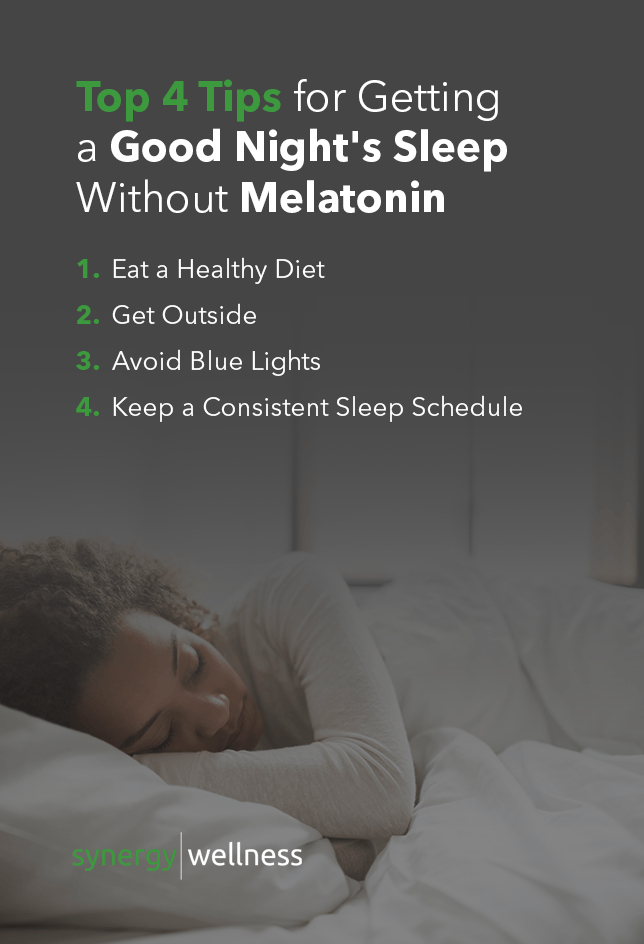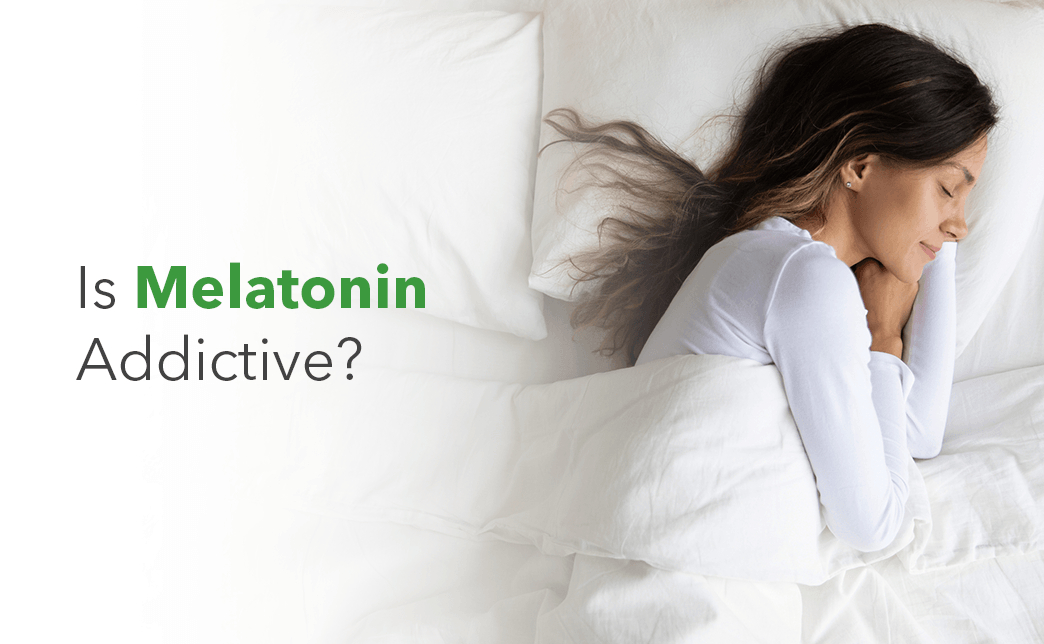
More than a third of adults in the United States don’t get enough sleep. In some cases, sleep deprivation may be due to a short-term stressor, such as an impending marriage or promotion. In other cases, lack of sleep may be due to a more severe health condition, such as drug addiction, shift work sleep disorder or dementia. Whatever the reason, insomnia can have extensive physical and emotional implications. While many prescription sleep aids are available, many adults hesitate to take them, either because they worry some medications might be habit-forming or because they prefer a more natural solution.
Melatonin supplements are a popular alternative to over-the-counter and prescription sleep medications because they are low-risk when taken for short periods. Besides that, this supplement’s side effects are relatively mild. But what is melatonin, and how should you take it to get the best results with the fewest side effects?

What Is Melatonin?
Melatonin is a chemical the human brain produces to regulate the body’s sleep-wake cycle, commonly referred to as your circadian rhythm. In other words, it tells your body when to go to sleep and when to wake up.
The pineal gland — an organ deep inside your brain — produces the hormone melatonin. When the sun goes down, it triggers the pineal gland to release elevated melatonin levels, which is why the average person begins to get sleepy after dark. Increased levels of melatonin signal the rest of the body that it’s time to get rest. In the morning, as it becomes lighter, the pineal gland slows melatonin production, and you start to wake up.
Melatonin is also a supplement designed to work as a sleep aid by increasing the melatonin inside your body. Supplements come in two forms — natural and synthetic. Natural melatonin comes from animals. While many people prefer using “natural” products, taking natural melatonin can expose the human body to viruses from the animal source.
Synthetic melatonin is human-made, with a chemical makeup designed to mimic natural melatonin. Adults with sleep problems may find using supplements to raise their melatonin levels triggers their body to have longer and better-quality sleep. While any adult might benefit from using melatonin supplements occasionally, they are most beneficial for those experiencing:
- Insomnia
- Jet lag
- Delayed sleep phase disorder
- Shift work sleep disorder
Melatonin also benefits adults experiencing other medical issues that have poor sleep quality as a side effect, including:
- Depression
- Bipolar disorders
- Schizophrenia
- Alzheimer’s disease or dementia
- Pre- or post-surgical anxiety
As a supplement, melatonin is available in liquid, pill and chewable tablet form.
Can You Become Addicted to Melatonin?
Because melatonin supplements mimic a natural hormone, the human body can’t build up a tolerance to it or experience withdrawal symptoms the way it would with a medical sleep aid. However, you might experience some mild melatonin side effects while taking this supplement. These include:
- Headaches
- Dizziness
- Drowsiness
- Nausea
- Irritability
- Daytime sleepiness
- Anxiety
- Bedwetting in children
While severe side effects of melatonin are rare, some users have reported them. These include:
- Increased bleeding in adults with a bleeding disorder
- Depression
- Stomach cramps
In some cases, melatonin may interact with specific medications, including:
- Contraceptives
- Anticonvulsants
- Anti-platelet drugs and anticoagulants
- Immunosuppressants
- Diabetes medications
Children and breastfeeding or pregnant people should check with their doctor before using melatonin because there is a distinct lack of research on melatonin’s possible impact on these populations.

Doctors typically recommend using melatonin for the temporary relief of sleep issues. Melatonin can help you get a full night’s rest while your doctor diagnoses any underlying conditions and develops a treatment plan to address the reason you can’t sleep. It’s also an excellent short-term solution for overcoming jet lag or catching up on sleep after traveling for an extended time. Besides being a gentle alternative to prescription sleep medications, many people prefer to use melatonin because short-term use isn’t habit-forming. Researchers have yet to find evidence of addiction or other dangers of taking melatonin in the short term.
However, please note that there is a notable lack of conclusive information on the impact of long-term melatonin use. Doctors and researchers don’t know what might happen to people who rely on melatonin night after night. And using melatonin to induce drowsiness may be covering up a more severe case of sleep disorders or insomnia. After a week or two of using melatonin, try stopping and see what happens. If you find all your symptoms returning, contact your doctor so they can initiate diagnostic tests to get to the heart of the problem. Because research on long-term melatonin use is so scarce, it’s not a good idea to use it for a long period.
What Is a Safe Dose of Melatonin?
Supplemental doses of melatonin vary by product. Most melatonin supplements recommend taking one to three milligrams each night two hours before bedtime. However, you might find it sold as high as 10 milligrams per dose. For this reason, it’s a good idea to consult with a doctor to identify the correct dosage for your body and your needs. While it may be possible to take a higher melatonin dosage under a doctor’s care, one question that patients often ask is, “Can you overdose on melatonin?”
It is possible to consume too much melatonin from supplements. Some of the side effects of excess melatonin include:
- Difficulty falling asleep
- Difficulty staying asleep or achieving a restful sleep
- Lucid dreaming
- Feelings of drowsiness or fatigue in the morning
- Diarrhea
- Joint pain
- Irritability
- Depression and anxiety
- Headaches
- Nausea
- Mild tremors
- Abdominal pain
- Dizziness
If you take excessive amounts of melatonin on top of certain medications, you may also be at higher risk for seizures, high blood pressure, excess bleeding and poor immune function. If you haven’t taken melatonin before, you might also experience an allergic reaction to one or more of the additives in the supplement. Taking a large dose of melatonin can exacerbate this reaction.
When Should You Take Melatonin?
While you must exercise caution when using melatonin and other supplements, they are generally safe to take for short periods under a doctor’s supervision. But to derive maximum benefits from a melatonin supplement, timing is crucial. Because melatonin plays an essential role in regulating your body’s circadian rhythm — the sleep-wake time you experience each day — it’s best to take it between 30 minutes and two hours before bedtime. But if you’re taking it to address lack of sleep due to a specific medical condition, this may vary. For example, if you suffer from DSPS, a condition in which your body doesn’t get tired until 1 or 2 a.m., you may want to take melatonin two hours before the time you want to fall asleep. So, if you hope to fall asleep at 11 p.m., take melatonin at 9 p.m.
Unless you’re using melatonin to address delayed sleep phase disorder, which we mentioned above, go to bed within an hour of taking melatonin. If you push yourself to stay awake, you lose some of melatonin’s beneficial effects. You may also experience some of the side effects you’d miss if you were asleep, such as drowsiness or dizziness. Avoid driving or operating machinery once you’ve taken melatonin, as it may interfere with your ability to engage in these activities safely.
Is It Safe to Take Melatonin Every Day?
Existing studies have shown that it is safe to take melatonin daily for short periods, such as a few days after changing time zones for travel or after surgery. Because there isn’t much research into long-term melatonin use, if you experience disrupted sleep for more than a few days, talk to your doctor. Your ongoing problem with lack of sleep may be the symptom of an underlying medical problem.
Melatonin can also interfere with some medications and medical conditions. If you are under a doctor’s care for seizure disorders, autoimmune disorders, bleeding disorders, diabetes or high blood pressure, check with your medical team before adding a melatonin supplement to your daily routine.
In some cases, children may be able to take small doses of melatonin for brief periods, but there is not a lot of research available on the effects of melatonin in children. Anyone taking this supplement should always exercise caution and check with a doctor to prevent unwanted reactions and manage side effects appropriately.
Top 4 Tips for Getting a Good Night’s Sleep Without Melatonin

While a melatonin supplement can help you get a complete seven to nine hours of restful sleep, you can also take specific steps to encourage your body’s natural melatonin production.
1. Eat a Healthy Diet
Have you heard of people who drink warm milk when they can’t sleep? Besides being comforting, there is a scientific reason this may aid in sleep. Some foods are rich in melatonin, so increasing your daily intake of these foods can improve your sleep. Melatonin-rich foods include honey, almonds, barley, strawberries, pineapple, oranges, oats, bananas, spinach, cherries, tomatoes and milk. If you’re in the mood for a late-night snack, grabbing one or more of these foods can help you get an extra boost of melatonin before you head to bed.
2. Get Outside
Spending time outside in the morning can help you sleep better. Why? Exposure to natural light earlier in the day prepares your body to respond to its increased melatonin levels at nighttime. But that doesn’t mean you’re out of luck if you don’t make it outside before noon. Exposure to natural light throughout the day will create a more pronounced response from your body when it gets dark.
3. Avoid Blue Lights
The blue light emitted from computer, tablet and phone screens can interfere with your body’s natural melatonin production. Limit or eliminate exposure to screens in the evening to allow your body’s innate processes to work. If you must look at a screen in the evening, apply a filter to reduce exposure to blue light.
4. Keep a Consistent Sleep Schedule
Going to bed around the same time every night is an ideal way to encourage your body’s natural melatonin production. It can also be helpful if you’re taking melatonin supplements because of the timing involved in taking them. For example, if you know you’re going to bed at 10 p.m. every night, take melatonin between 9 and 9:30 p.m. Developing a consistent sleep schedule can also be beneficial because it will help regulate your body’s natural sleep-wake cycles. If you aren’t dealing with other underlying medical issues, you may find developing and maintaining a sleep schedule will eliminate your reliance on melatonin. You should also aim to wake up around the same time daily, so your body gets used to the routine.
Melatonin and Other Drugs
Is melatonin safe? In small doses, for short periods, the answer to that question is “yes.” However, even though melatonin isn’t a prescription medication, it’s best to treat it as one. Why? Because melatonin can interact with other drugs and cause potential health problems or unpleasant side effects you don’t want to experience.
Though the Food and Drug Administration regulates supplements to some degree, they are not subject to the same scrutiny a medication would be. Each supplement brand may provide a different dose or contain various ingredients and fillers. There is also scant research about melatonin’s reaction with other medications, drugs and alcohol. Because so much remains unknown about melatonin, it’s crucial to talk with your doctor before you begin taking it. A health professional can review your current and past medical history and spot any potential problems that may arise if you take a melatonin supplement. They can also advise you on the correct dose to take, as well as how long to take it.

Learn More About Substance Abuse Recovery at Synergy Recovery Services
Substance abuse can be a tangled, messy disorder. At Synergy Recovery Services, we have designed our program to help you reclaim the best version of yourself. Our Bakersfield, Calif.-based team of experienced medical professionals provides guidance every step of the way, strategically using a dynamic approach that simultaneously addresses the physical and emotional aspects of addiction. Our personalized addiction treatment program combines effective medications with intensive counseling to target the problem at its source and let you move forward to live your best life. If you or a loved one needs a discreet, professional substance abuse recovery program, contact us today.



